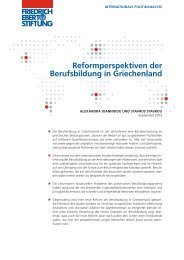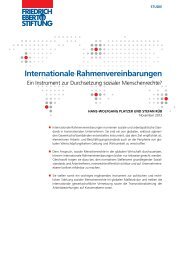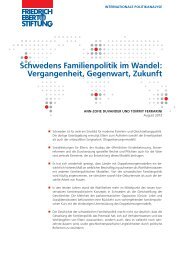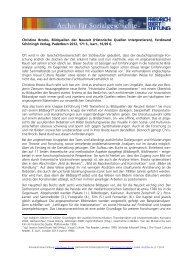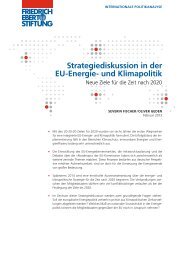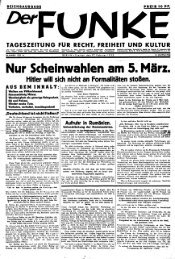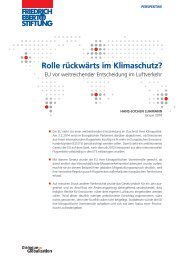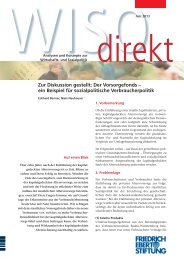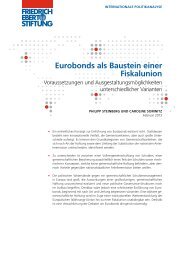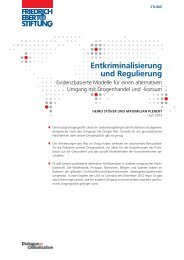Women - men - gender. - Bibliothek der Friedrich-Ebert-Stiftung
Women - men - gender. - Bibliothek der Friedrich-Ebert-Stiftung
Women - men - gender. - Bibliothek der Friedrich-Ebert-Stiftung
You also want an ePaper? Increase the reach of your titles
YUMPU automatically turns print PDFs into web optimized ePapers that Google loves.
40<br />
POLITICS AND TRADE UNIONS<br />
Experiences from Mexico<br />
Gen<strong>der</strong>–related work makes trade unions more attractive<br />
Gen<strong>der</strong>-related work can result in the mo<strong>der</strong>nization<br />
and democratization of the internal structures<br />
of trade unions and it can make trade unions<br />
fi t to take up global challenges. This has been the<br />
experience in Latin America and other continents<br />
as demonstrated by the project work un<strong>der</strong>taken<br />
by the <strong>Friedrich</strong> <strong>Ebert</strong> <strong>Stiftung</strong>.<br />
One of the most important issues in Mexico is the<br />
promotion of <strong>gen<strong>der</strong></strong> equality at the work-place.<br />
Why?<br />
With respect to <strong>gen<strong>der</strong></strong> stereotypes, most countries<br />
in Latin America are un<strong>der</strong>going change. Before<br />
the law, <strong>men</strong> and wo<strong>men</strong> have, for a fairly long<br />
time now, been equal. The reality, however, is<br />
somewhat different, especially with regard to the<br />
labor market. Over the past 50 years, Mexican wo<strong>men</strong><br />
have fought for a quantitatively larger share<br />
of the labor market. The radical changes in the<br />
Mexican economy since the 1980s have led to<br />
fl exibility and instability of jobs, impacting wo<strong>men</strong><br />
in particular. They earn on an average 35 per cent<br />
less than their male colleagues and a much higher<br />
proportion of wo<strong>men</strong> work in exploitative industrial<br />
sectors, where there is hardly any trade union<br />
presence.<br />
The increased participation of wo<strong>men</strong> in the labor<br />
market has garnered for them only a limited increase<br />
in decision-making within the Mexican<br />
trade unions, which continue to be dominated by<br />
male power structures and ideology. Trade unions<br />
are no exception to this philosophy in Mexico. The<br />
political culture and institutions are steeped in<br />
relationships of male loyalty and often prevent<br />
wo<strong>men</strong> from entering politics or occupying top<br />
positions.<br />
Mo<strong>der</strong>nization through <strong>gen<strong>der</strong></strong><br />
It is with good reason that the legitimation crisis of<br />
trade unions in Mexico is also rooted in the marginalization<br />
of wo<strong>men</strong> in the organizational and<br />
power structures of trade unions. <strong>Wo<strong>men</strong></strong> always<br />
had and continue to have few opportunities to take<br />
on the lea<strong>der</strong>ship role in the male dominated trade<br />
union structures. Often, these structures are authoritarian<br />
and non-transparent. <strong>Wo<strong>men</strong></strong> meet with<br />
resistance when they attempt to discuss issues such<br />
as discrimination at the work-place or unequal<br />
wages in their organizations. For the FES work in<br />
Mexico, this means that specifi c <strong>gen<strong>der</strong></strong> work not<br />
only helps wo<strong>men</strong> workers, but it is also a solid<br />
contribution towards the socio-political mo<strong>der</strong>nization<br />
of fossilized structures within the trade<br />
unions.<br />
The idea is not merely to achieve apparent <strong>gen<strong>der</strong></strong><br />
equality within the trade unions through a purely<br />
quantitative mechanism of wo<strong>men</strong>’s quotas, but<br />
rather, it is much more important to ensure that<br />
wo<strong>men</strong> active within the trade unions evolve their<br />
own style of lea<strong>der</strong>ship so that they do not conform<br />
to the established lea<strong>der</strong>ship structures of<br />
male trade unionists.<br />
FRIEDRICH-EBERT-STIFTUNG





